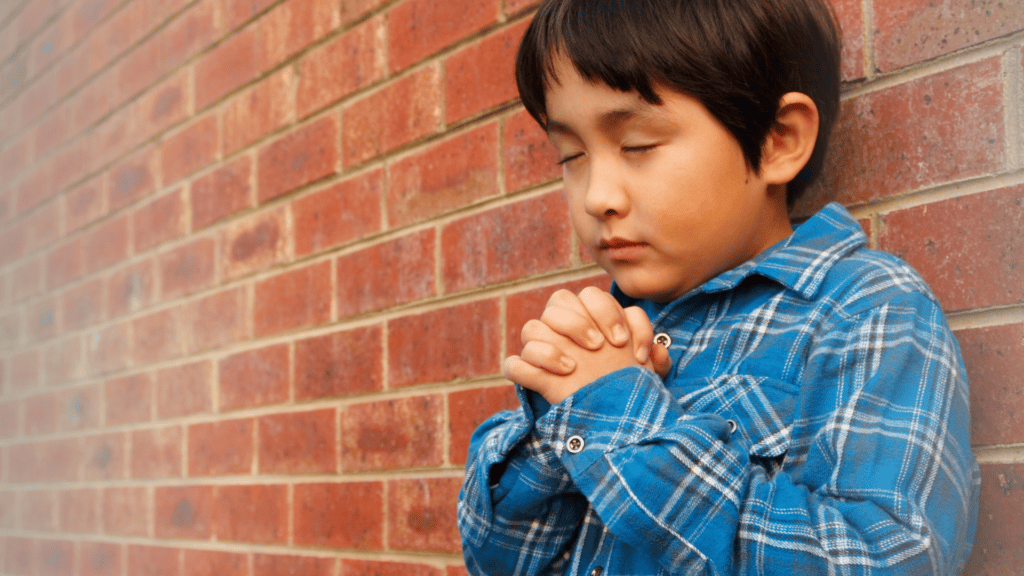
How To Put a Stop to the Blame Game in Marriage
Marriages only thrive as each spouse accepts responsibility for the impact of their own disappointments, fears and priorities on the relationship.

There is misconception that children should find their faith completely on their own.
Estimated reading time: 5 minutes
As a parent, should I take an active part in guiding my child’s spiritual growth? Or are spiritual matters a personal issue we should leave for our children to decide on their own when grown?
While I help my child learn to read, floss their teeth, and be kind, should parents influence their children regarding faith?
Can we sleep in on Sunday morning, or do I set the alarm to wake the sleepy crew, search the house for the missing shoe, pile into the car, and drive to church?
How important is it to invest regular time to read the Bible and teach my child to pray?
Children develop in four major categories; physically, emotionally, functionally, and spiritually. Physical development includes healthy habits in nutrition, good hygiene, and nurturing environments.
Emotionally, children learn to fully experience and contain their emotions and speak the truth.
Functionality, encompasses academics and ongoing life skills that prepare your child to be personally responsible and able to care for others.
The fourth important area of development is your child’s spiritual growth.
Faith is the most vital aspect of life. Relationship with God is the basis for hope and purpose in life. Our belief system is protected against agnosticism, hatred, prejudice, and superficial materialism. Faith translates into uncontested value for each individual, forgiveness, generosity, and grace.
God instructed parents to teach their children about spiritual things. “Hear, O Israel: The LORD our God, the LORD is one. You shall love the LORD your God with all your heart and with all your soul and with all your might.
And these words that I command you today shall be on your heart.
“Hear, O Israel: The Lord our God, the Lord is one. You shall love the Lord your God with all your heart and with all your soul and with all your might. And these words that I command you today shall be on your heart. You shall teach them diligently to your children, and shall talk of them when you sit in your house, and when you walk by the way, and when you lie down, and when you rise. Deuteronomy 6:4.
In the same way, a child requires guidance in every other aspect of life. They need guidance about their spiritual life. It is confusing when we leave a child to make “his own decision.”
Faith plays a fundamental role in a child’s understanding of their surrounding world. It provides insight into the beliefs and actions of those around them. Gentle guidance about your family beliefs helps a child comprehend his world.
However, it is important to note that as children mature into adulthood, they attain an age of accountability. As an adult, your child will get to choose to make faith his own. Once we reach an age of accountability, the ultimate choice belongs to each individual.
Maintaining an authentic relationship between you and your child includes creating opportunities to talk about everything – including faith, and the ethics and morality that stem from beliefs.
Guiding our child’s spiritual growth includes instruction on heart and soul care. The condition of our soul is vital because it impacts our overall health physically, emotionally, mentally, and spiritually. Matthew 15:11 cautions, “it is not what goes into the mouth that defiles a person, but what comes out of the mouth; this defiles a person.” What comes out of our mouth originates in our heart. “For from within, out of the heart of man, come evil thoughts, sexual immorality, theft, murder, adultery,” says Mark 7:21.
The condition of our heart and soul is reflected in our behavior.
Guilt, anger, greed, and jealousy begin in the spiritual level and bringing them into the light is life-giving for body and soul. As parents, it’s vital to equip our children to be their best, and give them tools to know how to tend to their heart and soul early.
Do a regular heart check:
Children who are spiritually healthy, whose hearts are well, are in a strong position to meet external challenges and pressures.
Church serves as the art studio and laboratory where those who attend can explore and develop spiritually within a faith-based community. Like our nuclear family, our spiritual family is glorious, messy, frustrating, and welcoming.
Involvement in a faith community provides you and your child with resources to tap and people to ask when questions arise. “And those who know your name put their trust in you, for you, O Lord, have not forsaken those who seek you.” Psalm 9:10.
Yes, the critics of religion and the church have some valid points.
Most of the things those outside the congregation dislike about the church are the same concerns of inside the church. But there is nothing else on the planet we completely jettison from our life merely because it is not perfect.
Within your church is a common faith. This provides solid common ground, a relationship glue that keeps us close to the Lord and connected to each other. No matter how many miles separate us.
Faith in daily life shows up in the face of bad news and someone says, “I don’t understand, but we will do this together,” and we pray for one another over the phone.
Spiritual conversations continue when a family member suggests we read a faith-based book and meet over Zoom to talk about the content. When we travel to attend a baby dedication and the children’s holiday program.
Our shared faith is seen in the race to see who is the first on Easter Sunday to send a text to the family group that declares, He is risen!
As a parent of seven, I found that guiding my children’s spiritual growth is the one thing that will have an eternal impact. That’s pretty important.